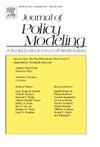印度当地的非农收入是否减缓了气候变化引起的移民强度?
IF 3.1
2区 经济学
Q1 ECONOMICS
引用次数: 0
摘要
虽然现有文献充分记录了气候变化对迁移的影响,但对当地非农业收入的调节作用却知之甚少。在此背景下,本文将印度气象局提供的实时天气数据与国际热带作物研究中心收集的印度东部和半干旱热带地区各邦非常丰富的家庭数据相结合,研究农民是否总是诉诸迁移,还是只有在本地多样化失败后才退而求其次选择迁移。利用递归计量经济模型观察发现,农户首先会尝试通过从事当地非农活动来实现收入多样化,而当地非农收入的可获得性进一步缓和了气候变化导致的产量损失对迁移的影响。高水平的移民可能会导致福利损失并影响城市的可持续发展,而移民的决定往往具有挑战性,因为它必须离开社会和社区网络。因此,我们的研究结果提供了宝贵的见解,并讨论了重要的政策建议,以改善当地非农活动的获取途径。本文章由计算机程序翻译,如有差异,请以英文原文为准。
Does local non-farm income moderate the intensity of climate change induced migration in India?
While the impact of climate change on migration is well documented in the literature, very little is known about the moderating impact of local non-farm income on climate change induced migration. To fill this gap in the literature, the paper combines real time weather data provided by Indian Meteorological Department with a very rich household data on Indian states belonging to the eastern and semi-arid tropic regions collected by ICRISAT to investigate whether farmers always resort to migration or take it up as a second-best option only after they fail to diversify locally on the face of climate change induced crop loss. Using recursive econometric model, it is observed that households first try to diversify their income by engaging in local non-farm activities and availability of local non-farm income further moderates the effect of climate change induced yield loss on migration. Higher rural out migration may adversely impact the agricultural sector and affect sustainable urbanization, Also, decision to migrate is often challenging as it necessitates leaving behind social and community networks. Therefore, our findings offer valuable insights and discusses important policy recommendations towards improving the access to local non-farm activities.
求助全文
通过发布文献求助,成功后即可免费获取论文全文。
去求助
来源期刊

Journal of Policy Modeling
ECONOMICS-
CiteScore
6.20
自引率
11.40%
发文量
76
期刊介绍:
The Journal of Policy Modeling is published by Elsevier for the Society for Policy Modeling to provide a forum for analysis and debate concerning international policy issues. The journal addresses questions of critical import to the world community as a whole, and it focuses upon the economic, social, and political interdependencies between national and regional systems. This implies concern with international policies for the promotion of a better life for all human beings and, therefore, concentrates on improved methodological underpinnings for dealing with these problems.
 求助内容:
求助内容: 应助结果提醒方式:
应助结果提醒方式:


